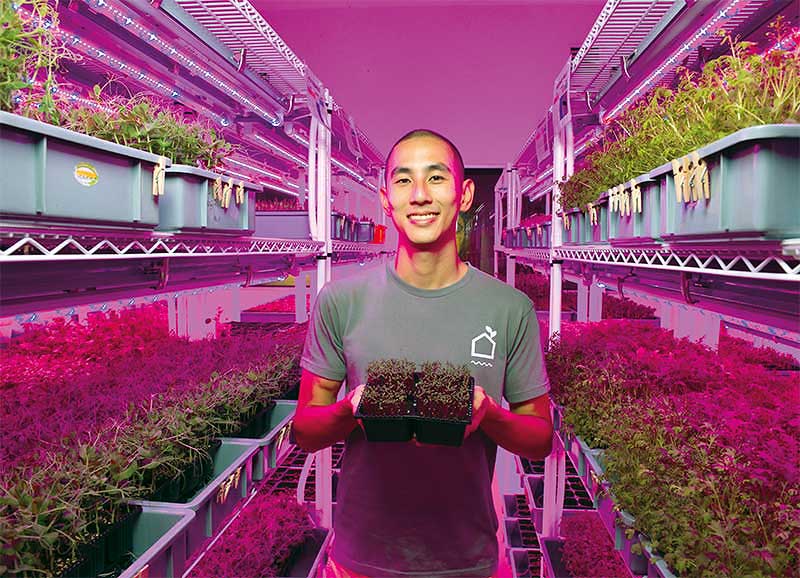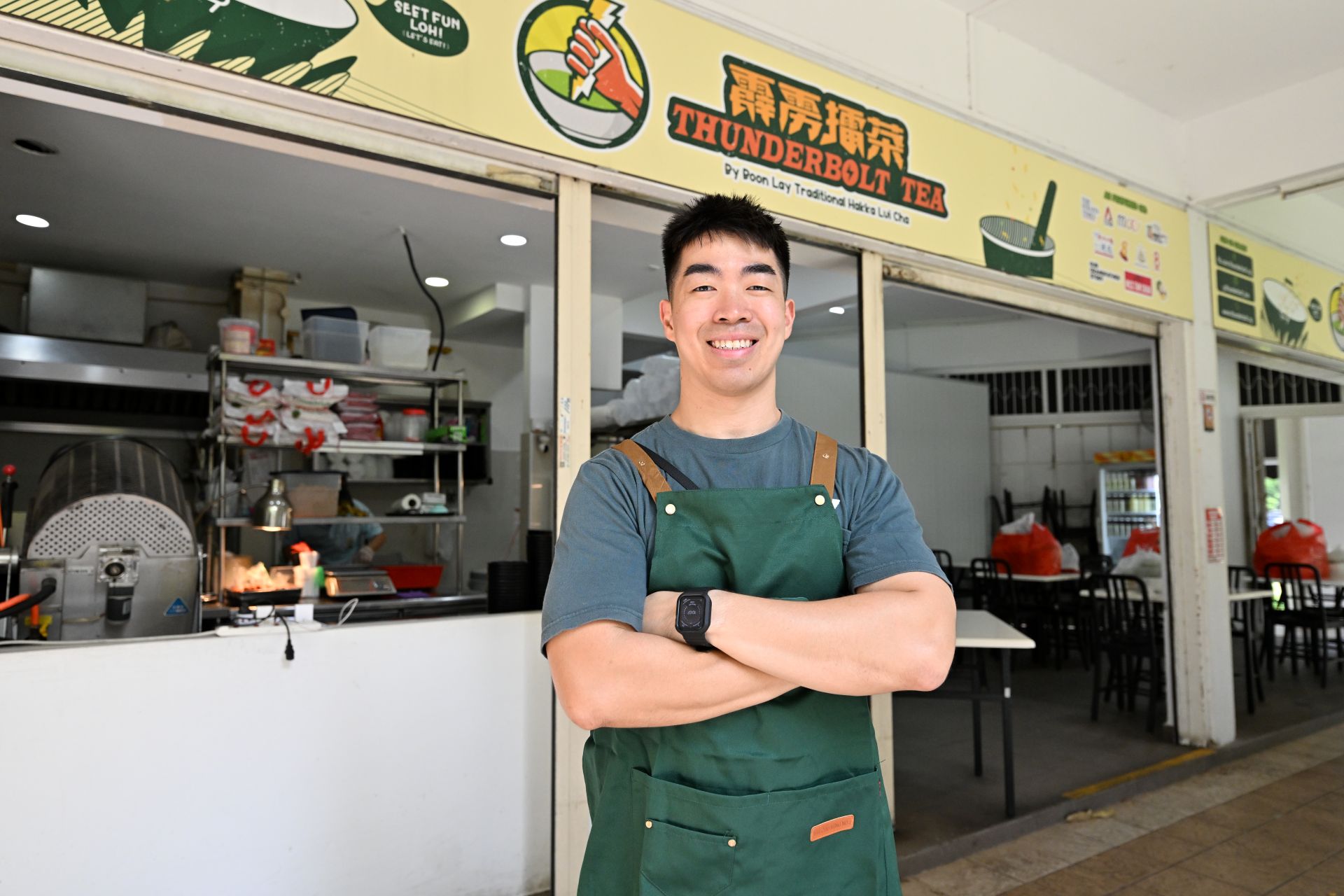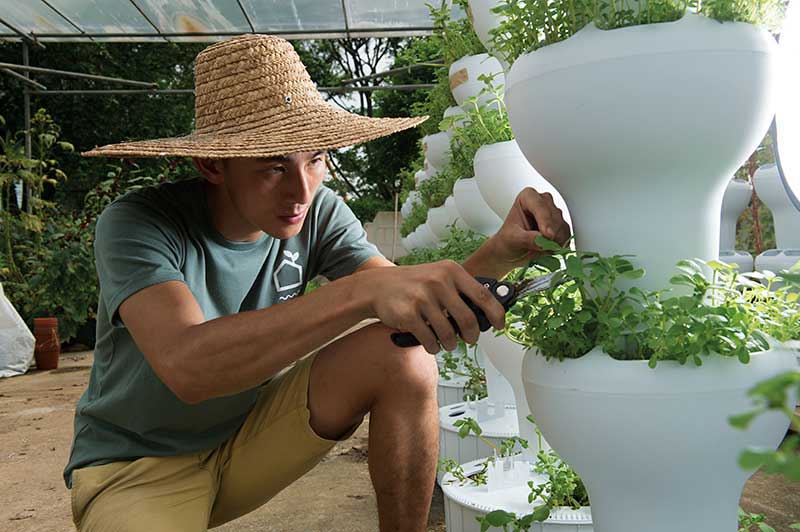PEOPLE
URBAN FARMER
01 Dec 2017
Lieutenant (LTA) (NS) Christopher Leow Hsien Chong dreams of a world where everyone grows their own food in their gardens or even rooftops.

'The only easy day is yesterday' was a quote often repeated by my instructors while I was serving National Service, and it has helped me overcome many challenges in my life and career.
- LTA (NS) Leow on his NDU experience
Five years ago, 24-year-old LTA (NS) Leow decided to take a break from his hectic 20-hour work days, to travel the world. An Internet advertisement recruiting farm helpers in Australia led the former bakery cafe owner to live with a self-sufficient Australian couple for a year.
"They introduced me to farming and it was the first time I tried growing my own food. I felt extremely accomplished when I saw my crops growing well -- food just tastes better when you grow the ingredients yourself!"
After returning to Singapore in 2013, LTA (NS) Leow wanted to carry on this way of living. He gave up his cafe and decided to educate people on the advantages of growing their own food so that areas that were originally allocated for agricultural activities can be put to other uses.
During his venture into urban farming, LTA (NS) Leow met a like-minded friend, Mr Bjorn Low, who had openings for volunteers in his company Edible Garden City. "I signed up because we share the same vision.
"Both of us wish to inspire citizens to grow their own food and envision a world where everyone is self-sufficient."
Green champion
Fast-forward five years and LTA (NS) Leow is now the Head of Greens in charge of business development and operations at Edible Garden City, which champions the grow-your-own-food movement.
He and his team have worked to turn many underutilised land spaces in Singapore into small farms. They also push boundaries by growing unique produce, such as edible flowers.
"Currently, we have more than 50 food gardens in Singapore that can be found on the rooftops of buildings such as Raffles City or in schools such as Nanyang Technological University. These gardens produce food for a wide range of clients such as restaurants, schools and hotels."
LTA (NS) Leow was also part of the pioneering team that created Citizen Farm, a closed-loop production farming model located in Queenstown.
He explained: "Conventional farming often uses large amounts of fertilisers and pesticides which are detrimental to the environment. Our closed-loop model takes the wastes from one system and puts it into another which can benefit from them.
"For example, in mushroom farming, we use coffee grounds and mushroom substrate (a substance or surface that an organism grows and lives on) to grow mushrooms. After the mushrooms have been harvested, we use the remaining mushroom substrate as natural fertilisers for our next batch of crops."
Touching lives
With the fast pace of city-living in Singapore, it has not been easy for LTA (NS) Leow and his team to convince the public that urban farming is relevant to their lives.
"Living in a concrete jungle where produce is readily available, most do not see the need to grow their own food. Also, they tend to relate farming to large amounts of crops maintained by bulky and expensive machinery, and they think of farmers as unskilled labourers whose work is too physically demanding."
However, LTA (NS) Leow is bent on changing this mindset. "We organise tours around our gardens to show Singaporeans that farming can be simple and fun. We have also been developing curriculum for schools to teach students about urban farming so they can realise its importance."
Changing people's perceptions is not easy but LTA (NS) Leow's personal mantra keeps him motivated.
"'The only easy day is yesterday' was a quote often repeated by my instructors while I was serving National Service, and it has helped me overcome many challenges in my life and career," said the Platoon Commander in the Naval Diving Unit (NDU).
Having gone through adversities such as the infamous "hell week" -- where naval diver trainees perform intense physical exercises while fighting fatigue and sleep deprivation -- LTA (NS) Leow has become stronger mentally. "The tough training taught me perseverance as it pushed me to my physical and mental limits."
Creating a green world
In 10 years, LTA (NS) Leow hopes that the company will take root in other countries and that the world will have more urban farms that produce food in an environmentally friendly way.
"I envision small, decentralised and sustainable farms integrated in commercial buildings, residences and schools all over the world, and I see Edible Garden City as a leader that spurs this movement."
Asked if he was being overly ambitious, LTA (NS) Leow replied confidently: "We've got a great team and a fantastic company culture where everyone works silently towards a common goal. We will give everything we've got to start a green revolution."
ALSO READ IN PEOPLE

Rising above the tide & stepping forward to lead
13 Dec 2025
They’re among the SAF’s latest batch of officer graduands this year. Meet 2LT Mohamad Wira Kuriniawan and 2LT Ryan Ong, who will be heading to the Navy’s 180 Squadron and 1st Battalion, Singapore Guards respectively.

Guardian of the skies, guardian of family heritage
08 Dec 2025

Father & son, bonded by service
02 Dec 2025




